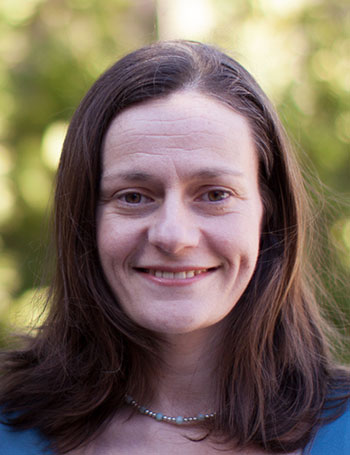
This is what Kerri Sheppard sings to begin her class on a breezy morning at Groff Park in Amherst. Following her lead, seven preschool-age children and their mothers flap their arms and run around the grassy hillside. Sheppard asks them what other animals they can pretend to be, and they improvise new verses to the song as they dash like cheetahs, leap like dolphins and crawl like spiders. The kids’ task that day will be to experiment with paper-bag kites, rainbow streamers, spray bottles and their own five senses to come up with answers to the question, “What color is the wind?”
In less than a decade, Meghan Fitzgerald ’97 and her husband, Brian, have built Tinkergarten from a few classes in Brooklyn into a year-round outdoor education program involving nearly 1,900 teachers (called “leaders”) and reaching more than 130,000 children in 48 states.
The idea grew from Fitzgerald’s years as an elementary school classroom teacher and principal, hearing parents and other teachers express concern that, increasingly, “children didn’t know what to do with free time and needed adult direction,” she says. She worried they would not grow up into the kinds of “creative, collaborative and resilient” young adults that companies seek to hire.
But Fitzgerald also observed that many children who were distracted or disengaged in traditional classroom settings became “much calmer, much more focused, much more able to move” when playing and problem-solving out in the natural world.
Our goal from the beginning was to make sure that all children have access to this kind of playful, healthy learning.
So Tinkergarten allows kids to do just that. As “chief learning officer” of the for-profit company, Fitzgerald designs the curricula to engage students from 18 months to 8 years of age. (A pilot program for babies as young as 6 months is in progress this fall.) The classes have to be adaptable to local ecosystems ranging from snowy Buffalo, N.Y., to the Arizona desert. “We’ve had to think a lot about what kind of activities are general enough, and then train leaders on how to utilize the flora and the fauna and the new things they have in their environment,” she says.]
Cultural translation is necessary, too—stories about “forest faeries,” for instance, may be acceptable in some communities but not in others—and it’s becoming even more important as Tinkergarten considers opportunities to expand to Scandinavia and China. And the company has launched partnerships with Head Start to increase access for low-income families.
For Fitzgerald, who has three young daughters of her own, a key aspect of Tinkergarten is the involvement of parents. Moms and dads join in the classes, learning how to support their children’s development while making connections with other parents. Many parents are also trained as Tinkergarten leaders; this includes Kerri Sheppard, whose son is in her class.
Headquartered in Northampton, the company employs Amherst students as interns. Fawzi Itani ’18, who helps out with business development research, says Tinkergarten has bolstered his interest in education and in how companies can innovate to improve it. Sarah Wagner ’19’s favorite part of her internship has been helping Fitzgerald develop lesson plans. She appreciates that Tinkergarten has exposed her to ways to get involved in student learning, because, she says, “education is truly the way to change the world.”